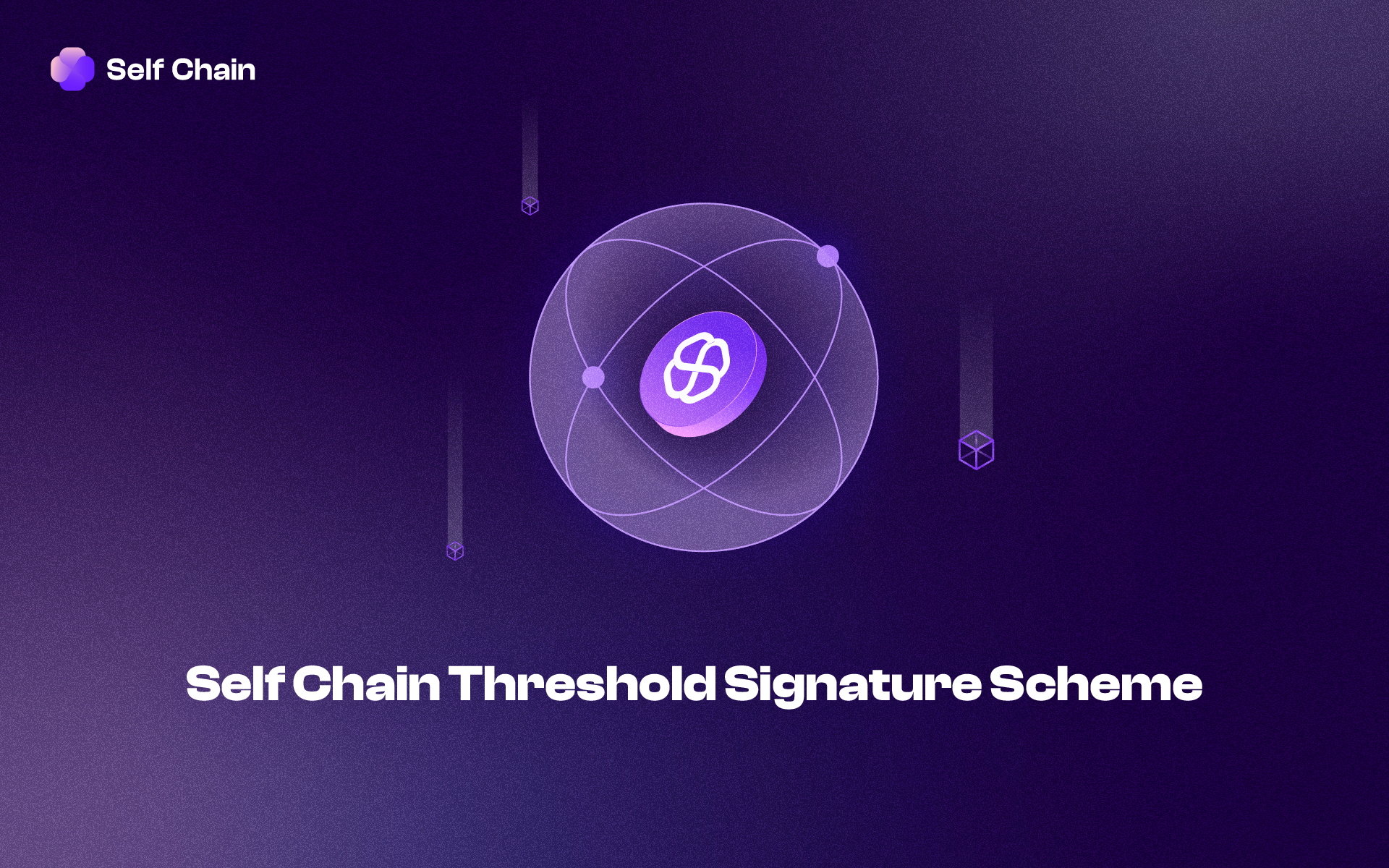Self Chain Threshold Signature Scheme
Self Chain is taking Web3 UX to the next level by integrating Threshold Signature Scheme (TSS), a cutting-edge technology that enhances how we manage and protect digital assets.

Self Chain is taking Web3 UX to the next level by integrating Threshold Signature Scheme (TSS), a cutting-edge technology that enhances how we manage and protect digital assets.
What is TSS and How Does It Work?
At its core, TSS shares some similarities with Multisignature (Multisig) wallets. In a typical multisig setup, multiple distinct wallets (let’s say m wallets) hold individual private keys. For a transaction to be valid, a specified number of signatures (let’s call it n) is required to co-sign the transaction. This system ensures that no single key can perform actions on its own, adding a layer of security. However, the exact verification process can differ from one blockchain to another. For example, on Bitcoin, multisig transactions are natively supported, whereas Ethereum requires the use of custom smart contracts.
TSS takes this a step further. Unlike multisig, where distinct wallets hold individual keys, TSS divides the signing process itself. In TSS, we still have an “m of n” setup, but none of the participants ever possesses a complete private key. Instead, each participant holds a “share” of the key (i.e., a partial cryptographic element). When signing a transaction, the participants collaborate, using their individual key shares to collectively generate one valid digital signature. In other words, the n shares come together to create one private key, but that private key is never fully formed or exposed.
Why TSS is Better Than Traditional Multisig Solutions
The distinction between TSS and Shamir’s Secret Sharing (SSS) is crucial for understanding its security advantages. While SSS also divides a private key into multiple shares, it requires the shares to be combined to recreate the original private key. This makes the system vulnerable, as the trusted entity responsible for combining the shares holds the entire key during the signing process.
In contrast, TSS never fully recreates the private key at any point. Instead, the signing process is fully distributed among multiple participants using their individual shares. This distributed process ensures no single party can compromise the transaction, making TSS inherently more secure. There is no trusted entity holding the private key, meaning the risk of key theft is dramatically reduced.
Privacy and Security: Key Benefits of TSS
The privacy and security benefits of TSS make it ideal for blockchain wallets, and by integrating MPC (Multi-Party Computation), Self Chain guarantees that:
- No private key is fully constructed at any stage of the signing process.
- Key shares are never exposed to any single party, even during transaction signing.
- The process is resistant to hacking and single-point failures, as multiple participants are required to generate a valid signature.
This cryptographic method ensures that users maintain control over their assets without fear of a single point of compromise.
How Self Chain Uses TSS to Power Keyless Wallets
At Self Chain, TSS plays a central role in the Keyless Wallet infrastructure. Traditional wallets depend on users managing their private keys, which can be lost or compromised. By incorporating MPC-TSS, Self Chain eliminates the need for private key management while still offering the highest levels of security.
In Self Chain’s system:
- The private key is divided into three encrypted shares: one stored on the user’s device, one on the Self Chain network, and one as a recovery share stored in a secure cloud. None of these shares can reconstruct the key individually.
- During a transaction, all three shares work together to create a valid digital signature—without ever exposing the full private key.
Conclusion
By implementing Threshold Signature Scheme (TSS) and MPC, Self Chain is transforming how blockchain transactions are secured and executed. TSS brings a level of security and privacy unmatched by traditional multisig or SSS solutions, making it an ideal foundation for Web3 and the next generation of decentralized applications. With Self Chain’s Keyless Wallet, users enjoy the peace of mind that their assets are protected by the latest in cryptographic technology, without the complexity of managing private keys.
As Self Chain continues to push the boundaries of what’s possible in blockchain technology, TSS stands out as a groundbreaking innovation in ensuring the security and usability of decentralized finance (DeFi) and other applications.
Stay tuned as Self Chain continues to lead the way in secure, user-friendly blockchain solutions!
About Self Chain
Self Chain is the first Modular Intent-Centric Access Layer1 blockchain and keyless wallet infrastructure service using MPC-TSS/AA for multi-chain Web3 access. The innovative system simplifies the user experience with its intent-focused approach, using LLM to interpret user intent and discover the most efficient paths.
Self Chain ensures that onboarding and recovery are effortless with keyless wallets that grant users complete self-custody over their assets. In addition, it provides automated rewards to dApps when they efficiently resolve user intent, further enhancing the user experience. Moreover, Self Chain incorporates Account Abstraction with MPC-TSS to provide secure signing and reduce transaction fees. It's a platform that redefines blockchain interaction, making it more secure and user-friendly for everyone.
In a world where blockchain technology is becoming increasingly essential, the user experience remains a critical factor in its adoption. Intents and Keyless Wallets are set to transform the landscape, making blockchain interactions more accessible, efficient, and secure. As we move forward, the blockchain industry has the opportunity to provide users with a seamless and enjoyable experience, unlocking the full potential of this groundbreaking technology.
